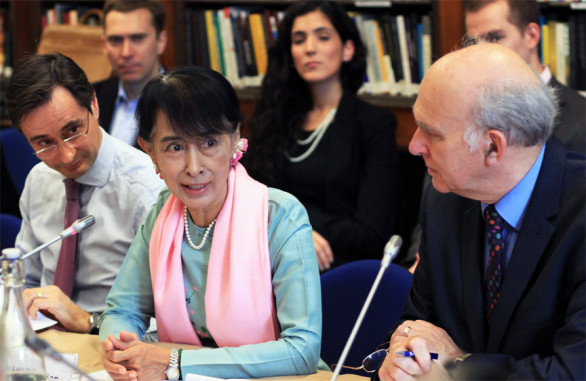Conference at Indianapolis to focus on supporting reform in Myanmar
Source: IU Newsroom
May 20, 2015
FOR IMMEDIATE RELEASE
BLOOMINGTON, Ind. — Organizers of a May 29 conference in Indianapolis are seeking to support the ongoing reform process in Myanmar and encourage Burmese expatriates to offer support economically and educationally.
Among those expected to attend and speak at the U.S.-Myanmar Engagement Conference, from 9 a.m. to 5 p.m. at the IUPUI Campus Center, are U Kyaw Tin, permanent United Nations representative of the Republic of the Union of Myanmar.
Nobel Laureate Aung San Suu Kyi will speak at the conference through a video message. She is expected to address critically important issues such as the need for constitutional reform as part of fundamental change and political development in Myanmar, as well as economic development there.
She is expected to discuss policy and action priorities of the National League for Democracy, both before and after upcoming elections.
Other speakers will include Aye Sanda Lwin, economic attaché of Myanmar to the United States; Harn Yawnghwe, executive director of the Euro-Burma Office; Anne Gillman, Burma/Myanmar desk officer in the Office of ASEAN and the Pacific Basin at the U.S. Department of Commerce; Nicholas Farrelly, a fellow at the College of Asia and the Pacific at Australian National University and co-director of the ANU-IU Pan Asia Institute; and Dany Khy, economic growth team leader in the Asia bureau of the U.S. Agency for International Development.
Conference organizers hope the daylong event will provide a holistic overview of Myanmar’s economic and political outlook and the growing diplomatic and economic relations between Myanmar and the United States.
The Center for International Business Education and Research, part of Indiana University’s Kelley School of Business, and the Center for Constitutional Democracy in the IU Maurer School of Law are co-hosting the conference with the Burmese American Community Institute. Also participating is IU’s Pan Asia Institute.
Participants will receive a better understanding of the current investment climate in Myanmar, specific legal requirements for foreign investment and how U.S. companies can responsibly contribute to the country’s economic growth.
The conference is open to all who are interested. However, registration is required at a cost of $20 per person. Lunch is included.
As Myanmar opens up more to the international community, the country’s president, Thein Sein, has invited western-educated expatriates to return, although there is no official process for doing so, said Elaisa Vahnie, executive director of the Burmese American Community Institute and an alumnus of IU’s School of Public and Environmental Affairs.
“The Burmese American Community Institute since 2011 has been looking to create strategic partnerships to be able to pool resources together and direct them back to Burma,” Vahnie said. “We advocate for responsible investment. … That requires in-depth and substantive discussions.”
More than 100,000 people of Burmese descent live in the United States today. More than 13,000 of them reside in the greater Indianapolis area, and another 4,000 live in other parts of Indiana.
Many Burmese expatriates, including Vahnie, received scholarships through the U.S. State Department to study at IU. For more than a decade, the Center for Constitutional Democracy at the IU Maurer School of Law has been working on democratic reform in Myanmar. David C. Williams, the John S. Hastings Professor of Law at the IU Maurer School, is executive director of the center and will be among the conference speakers.
“One of the reasons why it is so important to encourage well-educated Burmese individuals to return to Myanmar is because these individuals have gained exposure to democratic ideals and democratic values,” said Erin Biel, program coordinator of the Burmese American Community Institute, adding that they are “key to keeping this transition in check.”
The conference is important because it can help individuals think about how they can contribute to Myanmar’s future, Vahnie and Biel said.
“Since 2013, IU and its Kelley School of Business have placed great importance on working with Myanmar’s leaders to identify opportunities that will lead to economic development and a robust private sector there,” said LaVonn Schlegel, managing director of the Kelley School’s Institute for International Business, home to the IU CIBER. “We are excited to contribute to that transition in this way as well.”
The Kelley School was awarded $1 million from the U.S. Agency for International Development for a project supporting Myanmar’s economic transition. This Global Development Alliance project is extending the teaching and outreach capabilities of the Yangon University of Economics, under a memorandum of understanding with IU. It also is helping micro- to medium-sized business enterprises be more successful. This spring, the Kelley School sent a library of more than 1,900 textbooks donated by faculty members to the Yangon University of Economics.

